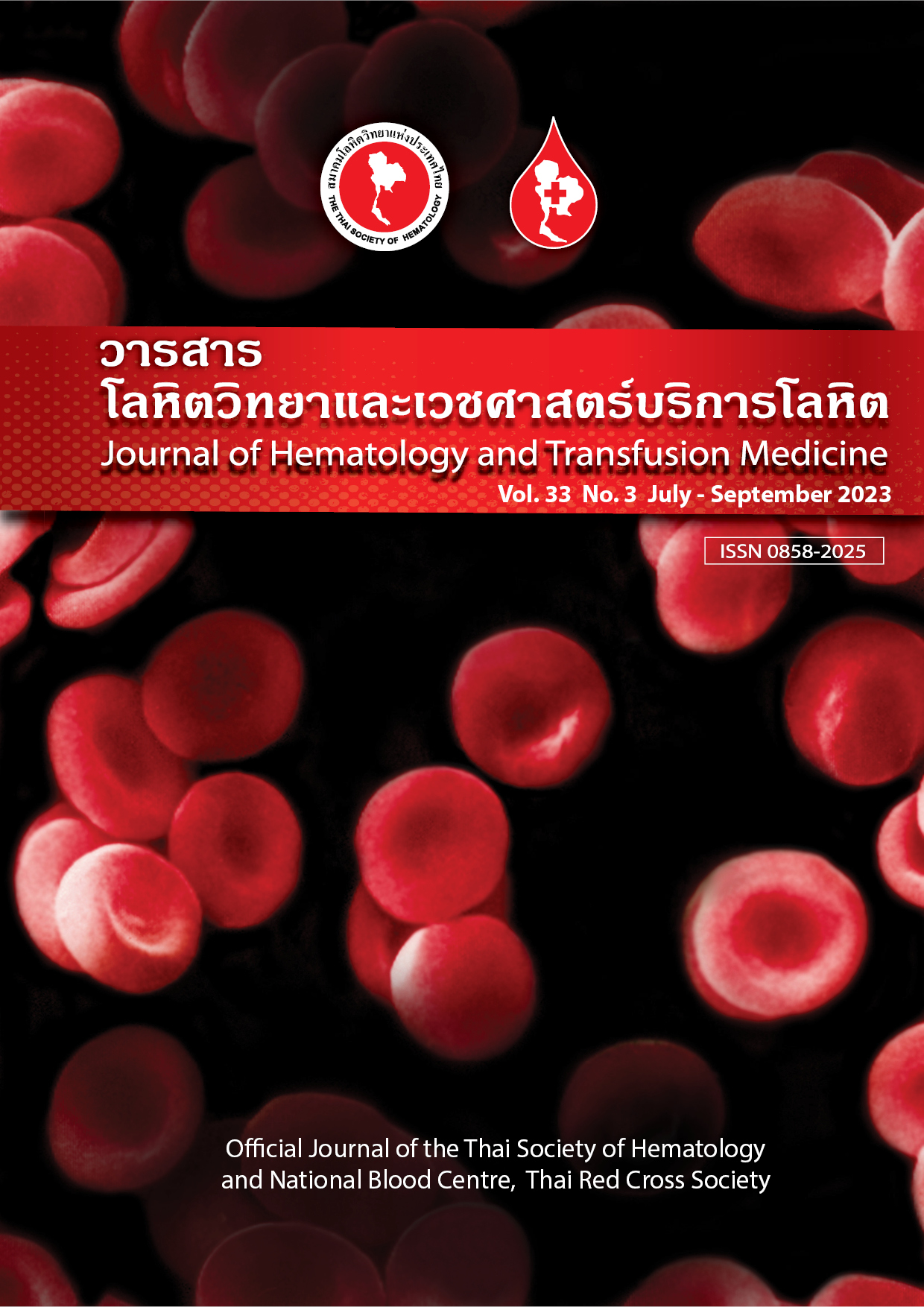ภาวะเลือดออกในโพรงน้ำสมองปริกำเนิดในทารกที่เกี่ยวข้องกับการใช้ยาวาร์ฟารินในมารดา
คำสำคัญ:
วาร์ฟาริน, สตรีตั้งครรภ์ , เภสัชพันธุศาสตร์, เลือดออกในโพรงน้ำสมองบทคัดย่อ
วาร์ฟารินเป็นยาต้านการแข็งตัวของเลือดที่มีความสำคัญในการป้องกันการเกิดลิ่มเลือดในผู้ป่วยที่ได้รับการผ่าตัดเปลี่ยนลิ้นหัวใจ อย่างไรก็ตาม การใช้ยาวาร์ฟารินในสตรีตั้งครรภ์อาจส่งผลเสียต่อทารกในครรภ์ ได้แก่ ความพิการของทารกตัวอ่อน และภาวะเลือดออกในทารก รายงานผู้ป่วยทารกแรกเกิดจากมารดาที่มีโรคหัวใจรูมาติกและได้รับการผ่าตัดเปลี่ยนลิ้นหัวใจไมทรัลต้องรับประทานยาวาร์ฟารินตลอดชีวิต ที่อายุครรภ์ 35 สัปดาห์ ทารกในครรภ์มีภาวะเครียดและได้คลอดโดยการผ่าตัดคลอดทางหน้าท้องฉุกเฉิน แรกเกิดทารกได้รับการกู้ชีพและใส่ท่อช่วยหายใจเนื่องจากมีอาการหายใจลำบากและมีภาวะโลหิตจางรุนแรง ภาพถ่ายเอกซเรย์คอมพิวเตอร์สมองพบมีเลือดออกในโพรงน้ำสมองขนาด 4.3 x 5.7 x 4.9 เซนติเมตร ร่วมกับเลือดออกในเนื้อสมองและมีภาวะสมองเคลื่อนที่ (brain herniation) ทารกได้รับส่วนประกอบของเลือดปริมาณมากเพื่อแก้ไขภาวะโลหิตจางและการแข็งตัวของเลือดที่ผิดปกติ การตรวจทางเภสัชพันธุศาสตร์ของยาวาร์ฟารินในมารดาและทารกพบว่า ทั้งมารดาและทารกมียีน CYP2C9 แบบ *1/*1 (ดั้งเดิม) และมีการกลายพันธุ์ของยีน VKORC1 ที่ตำแหน่ง -1639 GG>AA และ 1173 CC>TT การกลายพันธุ์ของยีนลักษณะนี้ทำให้การทำงานของเอนไซม์ vitamin K epoxide reductase ลดลง ส่งผลให้วิตามินเคและปัจจัยการแข็งตัวของเลือดที่พึ่งพาวิตามินเคมีปริมาณลดลง ซึ่งอาจเป็นสาเหตุที่อธิบายภาวะเลือดออกผิดปกติในทารกแรกเกิดรายนี้ ในการป้องกันภาวะเลือดออกรุนแรงในทารกที่เกิดจากมารดาใช้ยาวาร์ฟาริน การศึกษาทางเภสัชพันธุศาสตร์มีประโยชน์ในการกำหนดขนาดยาที่เหมาะสมเพื่อลดความเสี่ยงของการเกิดเลือดออก และแนะนำให้ทำการตรวจคลื่นเสียงความถี่สูงเพื่อประเมินสภาวะของทารกในครรภ์ตลอดระยะเวลาที่ตั้งครรภ์
Downloads
เอกสารอ้างอิง
Wong V, Cheng CH, Chan KC. Fetal and neonatal outcome of exposure to anticoagulants during pregnancy. Am J Med Genet. 1993;45:17–21.
McLintock C. Anticoagulant therapy in pregnant women with mechanical prosthetic heart valves: no easy option. Thromb Res. 2011;127 Suppl 3:S56-60.
Hall JG, Pauli RM, Wilson KM. Maternal and fetal sequelae of anticoagulation during pregnancy. Am J Med. 1980;68:122–40.
Sangviroon A, Panomvana D, Tassaneeyakul W, Namchaisiri J. Pharmacokinetic and pharmacodynamic variation associated with VKORC1 and CYP2C9 polymorphisms in Thai patients taking warfarin. Drug Metab Pharmacokinet. 2010;25:531–8.
Yan X, Yang F, Zhou H, Zhang H, Liu J, Ma K, et al. Effects of VKORC1 genetic polymorphisms on warfarin maintenance dose requirement in a Chinese Han population. Med Sci Monit. 2015;21:3577–84.
Oswal K, Agarwal A. Warfarin-induced fetal intracranial subdural hematoma. J Clin Ultrasound. 2008;36:451–3.
Lee HC, Cho SY, Lee HJ, Kim CJ, Park JS, Chi JG. Warfarin-associated fetal intracranial hemorrhage: a case report. J Korean Med Sci. 2003;18:764.
Masamoto H, Uehara H, Mekaru K, Uezato T, Sakumoto K, Aoki Y. Warfarin-associated fetal intracranial hemorrhage in woman with mitral valve replacements: a case report. Am J Perinatol. 2009;26:597–600.
Ville Y, Jenkins E, Shearer MJ, Hemley H, Vasey DP, Layton M, et al. Fetal intraventricular haemorrhage and maternal warfarin. Lancet. 1993;341:1211.
ดาวน์โหลด
เผยแพร่แล้ว
ฉบับ
ประเภทบทความ
สัญญาอนุญาต
ลิขสิทธิ์ (c) 2023 วารสารโลหิตวิทยาและเวชศาสตร์บริการโลหิต

อนุญาตภายใต้เงื่อนไข Creative Commons Attribution-NonCommercial-NoDerivatives 4.0 International License.



